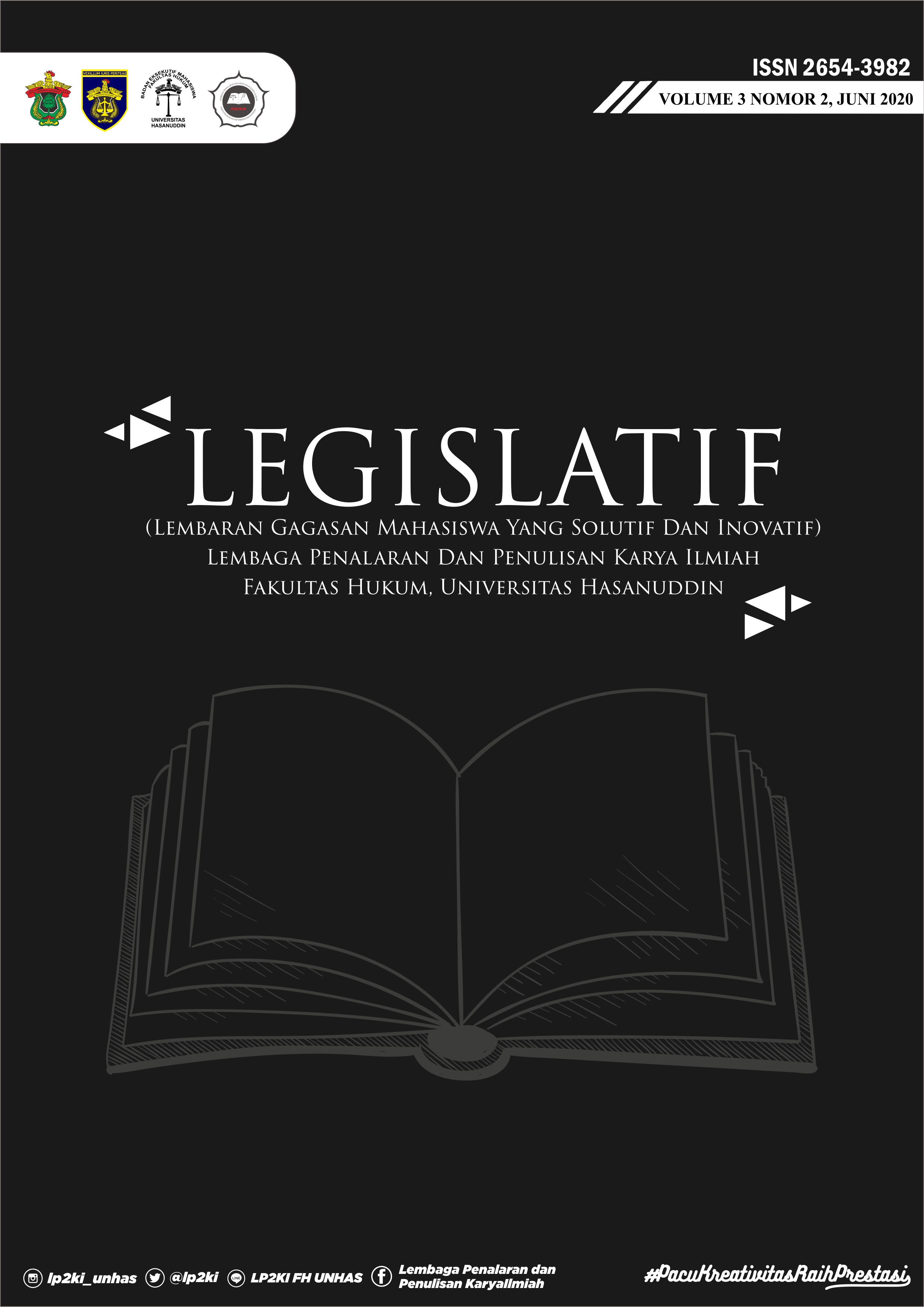KONSEPTUALISASI OMNIBUS LAW SEBAGAI UPAYA SINKRONISASI REGULASI PERGARAMAN DI INDONESIA
DOI:
https://doi.org/10.20956/jl.v3i2.10469Abstract
AbstractIndonesia is geographically an island country with two-thirds of the sea size greater than the mainland. A lot of potentials is generated by having a vast sea area, one of which is to produce salt. However, it has not been balanced with the capacity capability and the fulfillment technology of salt production nationwide. Moreover, from the policy side of government that continues to open the policy of salt imports, it weakens the competitiveness of local salts and less side to Salt pond. It becomes ironic as well as evidence that there is imprecision in the national development strategy, especially the government's handling of salt that leads to the choice of salt import policy. Based on these problems it takes implementation that is a stage of the determination of public policy, namely the process of bringing to a result or can also result in completing and completing. To produce effective policies based on objectives and objectives, implementation of the policy needs to be examined from the concept of policy, formulation process, implementation system, target group data collection system, access policy facilitation, community participation and stakeholders, supervision to evaluation. The method in this research is to use normative juridical research using a descriptive analysis that aims to describe the various legal issues that exist so that the right solution is obtained. Therefore, authors are interested in researching the implementation of the concept of omnibus law as a synchronization effort in Indonesia regulation. Keywords: Omnibus Law; Salt; Synchronization;
Abstrak
Indonesia secara geografis merupakan sebuah negara kepulauan dengan dua pertiga luas lautan lebih besar daripada daratan. Seiring perkembangan lingkungan yang strategis, peran laut menjadi signifikan serta dominan dalam mengantar kemajuan suatu negara. Banyak potensi yang dihasilkan dengan memiliki wilayah laut yang luas, salah satunya yaitu untuk menghasilkan garam. Namun, hal tersebut belum diimbangi dengan kemampuan kapasitas dan teknologi pemenuhan produksi garam secara nasional. Apalagi dari sisi kebijakan pemerintah yang terus membuka kebijakan impor garam, semakin melemahkan daya saing garam lokal dan kurang berpihak pada petambak garam. Hal ini menjadi ironis sekaligus bukti bahwa terdapat ketidaktepatan atau kesalahan dalam strategi pembangunan nasional khususnya penanganan pemerintah dibidang tata kelola pergaraman yang berujung pada pilihan kebijakan impor garam. Berdasarkan problematika tersebut dibutuhkan implementasi yang merupakan tahapan dari penentuan kebijakan publik, yakni proses membawa ke suatu hasil atau bisa juga akibat melengkapi dan menyelesaikan. Implementasi juga menyediakan sarana atau alat untuk melaksanakan sesuatu, memberikan hasil yang bersifat praktis terhadap sesuatu. Untuk menghasilkan kebijakan yang efektif sesuai tujuan dan sasaran, maka implementasi kebijakan perlu dikaji mulai dari konsep kebijakan, proses perumusan, sistem pelaksanaan, sistem pendataan kelompok sasaran, akses fasilitasi kebijakan, partisipasi masyarakat dan stakeholders, pengawasan hingga evaluasi. Metode dalam penelitian ini yakni menggunakan jenis penelitian yuridis normatif dengan menggunakan analisis deskriptif yang bertujuan untuk menguraikan berbagai permasalahan hukum yang ada, sehingga didapatkan solusi yang tepat. Maka dari itu penulis tertarik melakukan penelitian melalui implementasi konsep omnibus law sebagai upaya sinkronisasi regulasi pergaraman di Indonesia.
Kata Kunci: Omnibus Law; Pergaraman; Sinkronisasi;Downloads
Published
How to Cite
Issue
Section
License
We affirm our commitment to promoting open access to scientific research through this journal so that everyone can read, download, and use the published articles freely and without charge.











